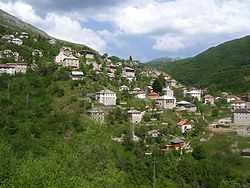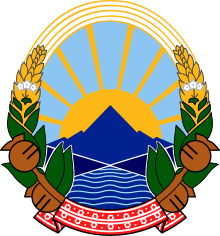Tourism in the Republic of Macedonia
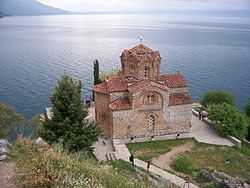
Tourism in the Republic of Macedonia is a large factor of the nation's economy. Macedonia's large abundance of natural and cultural attractions make it suitable for tourism.
In 2012, Macedonia received 663,633 tourist arrivals.[1]
Statistics
The Republic of Macedonia experiences a constant increase of visitors. The number of domestic tourists in the period from January to March 2008 compared to the same period of the previous year, increased 23.5%. While the number of foreign tourists in March 2008 compared to March 2007 increased 44.7%.[2] In 2007, Lake Ohrid had received about 250,000 domestic and foreign tourists.[3]
In February 2009, nearly 28,000 tourists, or 3.2% more than the same month last year, visited Macedonia. There was also an 8% increase in the number of foreign visitors to the country.[4]
The summer of 2009 was the city of Dojran's best tourist season with 135,000 overnight visitors, an increase of 12.5% compared to the previous year.[5]
The number of tourists in Macedonia in May 2010 increased by 0.8% from the same month in the previous year.[6]
The number of foreign tourists visiting Macedonia between the months of January and July increased by 25% in 2011 compared to the same period in 2010. The average amount of nights spent in the country by these tourists also rose, by 33.2%.[7]
In the first four months of 2012, the number of tourists in Macedonia was 130,083, an increase of 4.6% from the previous year.[8]
The Macedonian region receiving the most tourist arrivals in 2012 was the Southwest with 251,462, followed by the Skopje (164,077) and the Southeastern (106,978) regions. The Pelagonia region received 72,054 arrivals, while the remaining regions each received under 30,000.[1]
Among foreign tourists in 2012, the most common country of origin was Turkey with 50,406 arrivals, followed by Greece with 43,976 and Serbia with 36,530. The most common non-Balkan country of origin was the Netherlands with over 27,000 tourist arrivals.[1]
Destinations
Cities



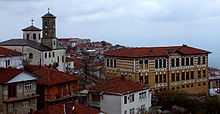
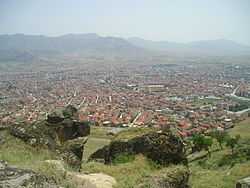
Skopje, the capital and largest city, is situated in the northern part of the country on the Vardar River. Skopje has a long history that is evidenced by its many archaeological sites, such as Scupi and the Skopje Aqueduct, and the large number of Ottoman buildings and monuments, particularly in the Old Bazaar, such as Mustapha Pasha Mosque. Today, Skopje, with over 500,000 inhabitants, is becoming a modern city with museums and many cultural and sporting events.
Ohrid, an UNESCO World Heritage Site, is located in the southwestern part of the country on the eastern shore of Lake Ohrid. The town is perhaps the most popular tourist destination in the country, which is largely due to the beaches and atmosphere. However, Ohrid also has many historical monuments, such as Samuil's Fortress and the Antique Theatre.
Bitola, the second largest city, is situated in the southern part of the country. Like many cities in the country, Bitola has also had a rich history. Heraclea Lyncestis, one of the Republic of Macedonia's largest archaeological sites, is located in Bitola. The long history of Bitola is also exemplified by the town's many neo-classical buildings, Ottoman buildings and monuments, and old churches. The town is also a shopping destination; Širok Sokak, a pedestrian street, is filled with an endless amount of stores and restaurants.
Štip, the largest city east of the Vardar River, is located in the eastern part of the country. Štip has existed for at least 2,000 years which is showcased by its many archaeological sites, such as Astibo, Bargala, and Estipeon. The city is also home to the healing waters of the Kežovica Mineral Spa. Today, Štip is the main cultural and economical centre of eastern Macedonia.
Other cities and towns in the country, such as Kratovo, Kruševo, Prilep, Strumica, and Struga, have many attractions of their own.
National parks and natural reserves

The Republic of Macedonia has three national parks and 33 natural reserves:
- Mavrovo, located in the northwestern part of the country, is the largest of the three national parks. It is home to several river valleys, gorges, waterfalls, caves, and other morphological formations.
- Pelister, located in the southern part of the country, near Bitola, is the smallest of the three national parks. The park consists of land that surrounds Baba Mountain. On top of the mountain are two glacial lakes, known as Gorski Oči, or mountain eyes.
- Galičica, located between Lake Ohrid and Lake Prespa, is the second largest national park in the country. The park is home to an abundance of diverse flora and fauna, and offers terrific views of Ohrid and Lake Ohrid.
- Ezereni Bird Sanctuary, located on the northern shore of Lake Prespa, is a strict natural reserve. It is home to over 120 different bird species.[9]
- Tikveš Strict Natural Reserve, located 30 km southeast of Kavadarci, is a natural reserve that covers an area of approximately 100 square kilometres. 23 species of predatory birds are present in the reserve and 17 of these nest in the area. Tikveš is said to be one of the most important ornithological sites in Europe.
- Lokvi-Golemo Konjari Strict Natural Reserve, located near Kruševo, is a natural reserve that is the last remnant of a once enormous swamp.
Other places
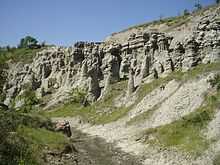
- Stobi, situated in Gradsko, in the geographical center of the country, is the largest and considered to be the most famous archaeological site in the Republic of Macedonia. Some remains include basilicas, streets, thermae, living complexes, mosaics, and walls.
- Kokino, located 30 km from Kumanovo, is a megalithic observatory similar to Stonehenge. Being over 3,800 years old, it is the fourth oldest ancient observatory in the world.
- Marko's Tower, located just outside of Prilep, is a rocky mass composed of several fine sculptures. It is on the list of possible UNESCO World Heritage Sites.
- Stone town of Kuklica, located outside Kratovo, is an area consisting of more than 120 naturally formed stone pillars that are over 10 million years old.
Festivals
- Balkan Festival of Folk Songs and Dances, annual folklore music and dance festival
- Galičnik Wedding Festival, an annual festival held in Galičnik in which a selected couple gets married in the traditional "Galička" style wedding
- International Children's Music Festival "Asterisks", an international children’s festival
- Ohrid Swimming Marathon, an international open water swimming competition in Lake Ohrid
Gallery
-
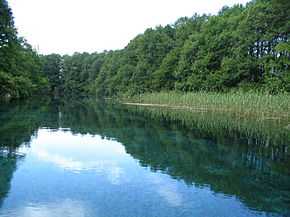
Black Drin River
-
Ishak Beg Mosque in Skopje
-
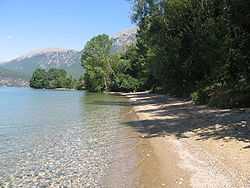
Beach near Ohrid
-
Waterfall in Kolešino near Strumica
-
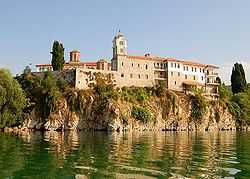
St. Naum monastery over Lake Ohrid
-
Ancient frescoes at St. Kalište in Struga
-
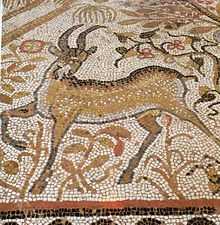
Mosaic at Heraclea Lyncestis
-

Aqueduct outside of Skopje
See also
References
| Wikimedia Commons has media related to Tourism in the Republic of Macedonia. |
- ↑ 1.0 1.1 1.2 "Tourism in the Republic of Macedonia, 2008-2012" (PDF) (in Macedonian). State Statistical Office. Retrieved 10 June 2013.
- ↑ State Statistical Office of the Republic of Macedonia
- ↑ Southeast European Times
- ↑ MINA
- ↑ Mina
- ↑ State Statistical Office of Macedonia
- ↑ MIA
- ↑ "Macedonia's 4-mo Tourist Numbers Rise 4.6% Y/Y - Table". Skopje: SeeNews. 13 June 2012. Retrieved 19 June 2012.
- ↑ Prespa region tourist site
External links
| Wikivoyage has a travel guide for Republic of Macedonia. |
- National Macedonian Tourism Portal
- Travel 2 Macedonia Tourism Portal
- Macedonia Timeless Tourism Portal
- VisitOhrid Official Info and booking Website
| |||||||||||||||||||||||||||||||||||||||||||||||||||||||||||
| ||||||||||||||










